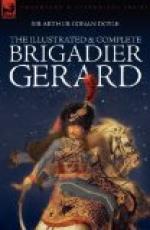By midday I had got as far as the village of Saalfeldt, but as I was on the direct road for Osterode, where the Emperor was wintering, and also for the main camp of the seven divisions of infantry, the highway was choked with carriages and carts. What with artillery caissons and waggons and couriers, and the ever-thickening stream of recruits and stragglers, it seemed to me that it would be a very long time before I should join my comrades. The plains, however, were five feet deep in snow, so there was nothing for it but to plod upon our way. It was with joy, therefore, that I found a second road which branched away from the other, trending through a fir-wood towards the north. There was a small auberge at the cross-roads, and a patrol of the Third Hussars of Conflans—the very regiment of which I was afterwards colonel—were mounting their horses at the door. On the steps stood their officer, a slight, pale young man, who looked more like a young priest from a seminary than a leader of the devil-may-care rascals before him.
‘Good-day, sir,’ said he, seeing that I pulled up my horse.
‘Good-day,’ I answered. ‘I am Lieutenant Etienne Gerard, of the Tenth.’
I could see by his face that he had heard of me. Everybody had heard of me since my duel with the six fencing masters. My manner, however, served to put him at his ease with me.
‘I am Sub-Lieutenant Duroc, of the Third,’ said he.
‘Newly joined?’ I asked.
‘Last week.’
I had thought as much, from his white face and from the way in which he let his men lounge upon their horses. It was not so long, however, since I had learned myself what it was like when a schoolboy has to give orders to veteran troopers. It made me blush, I remember, to shout abrupt commands to men who had seen more battles than I had years, and it would have come more natural for me to say, ’With your permission, we shall now wheel into line,’ or, ‘If you think it best, we shall trot.’ I did not think the less of the lad, therefore, when I observed that his men were somewhat out of hand, but I gave them a glance which stiffened them in their saddles.
‘May I ask, monsieur, whether you are going by this northern road?’ I asked.
‘My orders are to patrol it as far as Arensdorf,’ said he.
‘Then I will, with your permission, ride so far with you,’ said I. ’It is very clear that the longer way will be the faster.’
So it proved, for this road led away from the army into a country which was given over to Cossacks and marauders, and it was as bare as the other was crowded. Duroc and I rode in front, with our six troopers clattering in the rear. He was a good boy, this Duroc, with his head full of the nonsense that they teach at St Cyr, knowing more about Alexander and Pompey than how to mix a horse’s fodder or care for a horse’s feet. Still, he was, as I have said, a good boy, unspoiled as yet by the camp. It pleased me to hear him prattle away about his sister Marie and about his mother in Amiens. Presently we found ourselves at the village of Hayenau. Duroc rode up to the post-house and asked to see the master.




